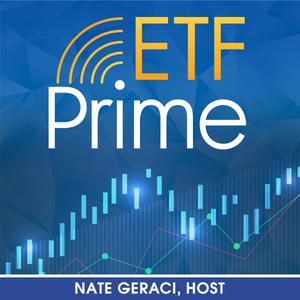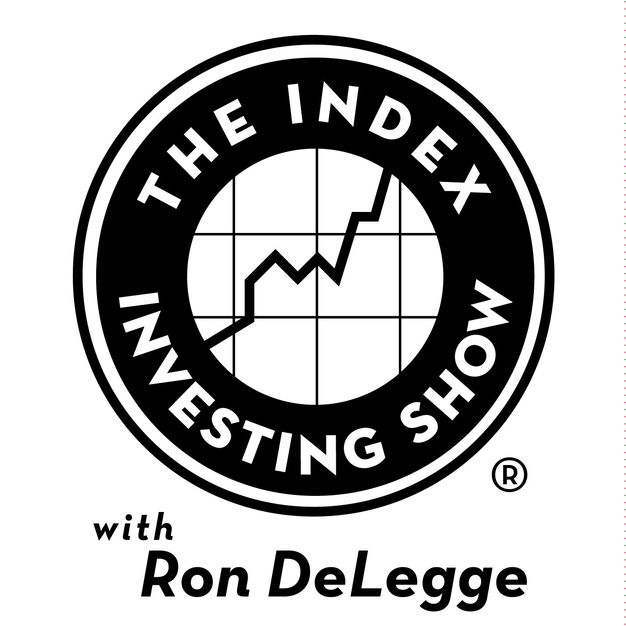
Money Life with Chuck Jaffe
Chuck Jaffe
Money Life With Chuck Jaffe
- 59 minutes 59 secondsHorizon's Ladner: 'Earnings-driven market' should post double-digit gains
Scott Ladner, chief investment officer at Horizon Investments, says that the stock market will need earnings growth to generate returns in 2025, but that those gains should run roughly equal to the level of earnings growth, leaving the market set up for low double-digit gains in 2025. He says that technology continues to provide a tailwind to the market, though henotes that the artificial intelligence evolution makes for a moving target where investors might want to gravitate towards industries that are adjacent to AI, making money off of the companies and sectors that use AI to drive profit gains. Ladner — whose firm practices goals-based planning — noted that while the U.S. economy remains the world's strongest, it would be a mistake to ignore international markets now. Leigh Purvis, prescription drug policy principal at the AARP Public Policy Institute discusses her research into showing that prices on brand-name drugs have been rising much faster than the rate of general inflation for decades, creating challenges — particularly for Medicare Part D enrollees — that many people have addressed by not refilling prescriptions or by skipping doses to make prescriptions last longer. Plus Dan Crowley, partner at Nightview Capital — portfolio manager of the Nightview Fund — brings his concentrated growth approach to the Market Call.
22 January 2025, 3:16 pm - 58 minutes 4 secondsSit Invest's Doty: 'The Fed's in a pickle'
Bryce Doty, senior portfolio manager at Sit Investment Associates says that "the elephant in the room" for the economy is the growing federal debt, now up to $36 trillion, which puts the Federal Reserve "in a pickle," because the debt will continue exploding if interest rates don't fall, but inflation could get out of control if the central bank cuts rates too fast. Doty sees an economy that will struggle to overcome that pressure, consumers that are reaching the limits on their spending and more, yet he doesn't foresee a recession this year just a slowdown that likely won't last long because he foresees the economy reaccelerating before year's end. David Trainer, founder and president at New Constructs celebrates Monday's holiday — which delayed his weekly appearance on the show — by discussing an undervalued, dividend-paying steel company stock as he turns his weekly Danger Zone into "The Attractive Zone," and financial psychotherapist Vicky Reynal discusses her new book, “Money on Your Mind” The Unconscious Beliefs That Sabotage Your Financial Well-Being – and How to Break Free.”
21 January 2025, 2:36 pm - 1 hour 2 minutesMacquarie's McCormack expects 'constructive environment,' healthy growth
Daniel McCormack, head of research for Macquarie Asset Management, says that heightened volatility in 2025 should make investors want to stay nimble and flexible, but he expects reasonable growth and a healthy environment. Sharing his outlook for 2025, McCormack says he expects China to begin "exporting inflation again," which could the U.S. back above a 3 percent inflation rate, which might slow down the pace of rate cuts, but it won't throw the economy into a recession. Larry Holzenthaler, portfolio manager for First Eagle Alternative Credit, gave his outlook for credit markets in 2025, noting that after avoiding default troubles when rates were rising, the picture is better now, particularly in private credit. Jennifer White discusses a J.D. Power study showing that consumers don’t think their bank will help them out in an emergency, and how banks might be more helpful than customers expect, and Chuck answers a listener question about sequence-of-return risk.
17 January 2025, 3:35 pm - 58 minutes 13 secondsUnlimited's Elliott: 'Curb your enthusiasm' on 2025's potential
Bob Elliott, chief investment officer for the Unlimited Funds, says investors entered 2025 with "euphoric expectations," but at a time when the market was going through a tightening, which is a set-up for the market to be flat or down for a few months. He says investors should curb their enthusiasm if they expect the market to perform as well as it has in the last two years, though he makes it clear that there are still good times to be had, just at the levels of 2023 and '24. Author Paul Podolsky discusses “The Uncomfortable Truth About Money," which is his latest book, focused on "living with uncertainty and [thinking] for yourself." Todd Rosenbluth, head of research at VettaFi, looks to the banking sector for his ETF of the Week.
16 January 2025, 2:16 pm - 1 hour 15 secondsCarson Group's Detrick sees 2nd-half pickup leading to solid 2025 results
Ryan Detrick, chief market strategist for the Carson Group, says growing earnings and profit margins are creating a dual tailwind for the stock market, and while he cites plenty of reasons for concern — including the potential for a double-digit market decline in the first half of 2025 — he's "not scared that the bull market is over." In both his 2025 outlook — released Tuesday — and in today's Big Interview, Detrick called for double-digit market gains, inflation that comes under control and allows the Federal Reserve to cut interest rates later in the year, and a change in market leadership that has him leaning into rebalancing and diversifying portfolios, with particular attention paid to financial, cyclical and industrial companies. Chip Lupo discusses a WalletHub survey which showed that more than 1 in 10 Americans blew up their credit card debt over the holiday season, and that more people are carrying debt without any plan on how to pay it off. In the Market Call, it's discount shopping in the closed-end fund aisle with Eric Boughton, chief analyst for Matisse Captial and manager of the Matisse Discounted Closed-End Fund Strategy fund.
15 January 2025, 1:00 pm - 57 minutes 16 secondsGlobal X's Helfstein: 'This is not the nice rosy year we had in '24'
Scott Helfstein, head of investment strategy for Global X ETFs says "Investors had better be ready for some chop" in 2024, but he thinks fundamentals are good and expanding and the market will broaden so that the economy and market pick up in areas that have not done well of late. Those conditions may create a volatile market but should help fight off a slowing pace of interest rate cuts. Helfstein sees several themes leading the way, most notably artificial intelligence — both the providers and the AI infrastructure — but also power companies, and then infrastructure investing. His take on infrastructure — particularly in the power business — aligns with that of Rob Thummel, portfolio manager of the Tortoise Energy Infrastructure Corp. (TYG) Fund, who lays out his case for the sector in the Market Call. Plus, Willie Delwiche of Hi Mount Research makes a technical case for the market to take a breather before it can get re-achieve record highs, and Chuck Bell of Consumer Reports discusses a recent federal proposal to ban the inclusion of medical debt on credit reports.
14 January 2025, 1:17 pm - 59 minutes 40 secondsSLC's Mullarkey:Amid global chaos, US markets will benefit the most
Dec Mullarkey, head of investment strategy at SLC Investments, says that when there is a lot of uncertainty and geopolitical risk, the United States economy and markets benefit from the situation, even if the unrest is partially caused by the U.S. As a result, while many observers worry about what might change under the new Trump Administration, Mullarkey expects economic stability, noting that "given all the headwinds we all can think of, [the U.S.) is better fortified than any other economy right now to sustain continuous growth this year. ... The rest of the world is more at risk." David Trainer, founder and president of New Constructs, revisits Sweetgreen, which he put into the Danger Zone in 2021 and subsequently named a "zombie stock," which has bounced back significantly this year, setting it up for another fall. Plus, John Dorfman, chairman of Dorfman Value Investments brings his classic value style to the Market Call.
13 January 2025, 2:01 pm - 1 hour 1 minuteSchwab's Sonders: The market, economy 'has decent legs,' but faces challenges
Liz Ann Sonders, chief investment strategist at Charles Schwab & Co., says that while the stock market has done well at the index level — where a few big names carried the benchmarks to big years — the fuller story has been told at a lower level, where the market has had more struggles and there have been rolling recessions in various areas of the economy without triggering a full-blown, broad-based downturn. She says those conditions will persist for at least the first half of 2025, with the market continuing to roll on if earnings remain strong; to that end, she noted that the market's current expectations — calling for 14 percent earnings growth — seem high, which should make investors cautious at least until they see forward-looking estimates. Mark Gatto, co-founder and co-chief executive officer at CION Investment Group, says that global infrastructure spending estimated at as much as $3 trillion annually worldwide is creating an asset class that can overcome political challenges and that has significant earning potential, which is why his firm recently announced plans for the new CION Grosvenor Infrastructure Fund. And in the Market Call, Jason Browne, president of Alexis Investment Partners and the Alexis Practical Tactical fund talks about ETF investing.
10 January 2025, 3:41 pm - 58 minutes 57 secondsRob Arnott sees 'opportunity-rich market' but not for mainstream stocks, bonds
Rob Arnott, chairman and founder of Research Affiliates, says that current markets resemble the dot-com markets in the narrative that everything is about to change due to technological advancements, but he notes that the dominant tech players from the year 2000 failed to beat the Standard & Poor's 500 index over the long-term future. He says that could happen again today with the artificial intelligence stocks, with the technology changing the world but the stocks having a less clear path forward. Arnott notes that the narratives have made the mega caps overvalued and the comparison to the dot-com era could continue with a market downturn, but he sees plenty of opportunities for investors who are willing to pursue deep value and small-cap strategies, as well as liquid alternatives and non-U.S. stocks to "have a decent shot at high single-digit returns" this year. Todd Rosenbluth, head of research at VettaFi, makes the exchange-traded version of a classic Fidelity fund his ETF of the Week, and Rob Lutts, president and chief investment officer at Cabot Wealth Management brings his classic growth investing style to the Market Call.
9 January 2025, 3:58 pm - 1 hour 1 minuteCrossmark's Doll says economic expectations for '25 are 'too ebullient'
Bob Doll, chief investment officer at Crossmark Global Investments, foresees some slowdown in consumer activity this year — with middle-income consumers beginning to struggle — and he says that will lead to a sluggish economy with higher unemployment. He expects inflation to remain sticky, which will push the Federal Reserve to make fewer rate cuts — he says it's possible they make no rate reductions this year at all — though he does believe the economy can stave off a recession. He reviews his 10 forecasts for the year ahead in The Big Interview. But he's not the only guest gazing into the crystal ball for 2025, as Greg McBride, chief financial analyst at BankRate.com, talks about what to expect from interest rates on everything from mortgages to savings accounts over the next 12 months. And in the Market Call, David Allen of the Octane All-Cap Value Energy ETF talks about finding under-the-radar issues in the energy sector.
8 January 2025, 3:49 pm - 1 hour 1 minuteiShares' Akullian: Earnings, not the Fed, will key the market in '25
Kristy Akullian, head of iShares Investment Strategy for the Americas at BlackRock, says that "the most important thing we're watching is earnings" as an indicator for the year ahead, noting that in 2024 more of the performance came from earnings growth than from multiple expansion, particularly for the parts of the market like large-cap growth companies that had a banner year. While the stock market is still looking for interest rate cuts, Akullian says that earnings can overcome any disappointment that is likely as the Federal Reserve slows the pace of rate cuts. For the year ahead — and iShares released its outlook for 2025 today — she is expecting modest gains, no recession, and continued struggles for international markets and small-cap stocks. Kim Blanton, who writes the Squared Away blog for the Center for Retirement Research at Boston College, discusses research which shows that delaying Social Security pays off for couples, but particularly for high-income families who get the best possible outcomes by being patient and who — because of their income — can afford to wait to achieve that outcome. Plus, Chuck answers questions about Morningstar and VettaFi and mutual fund research and ratings.
7 January 2025, 3:22 pm - More Episodes? Get the App
Your feedback is valuable to us. Should you encounter any bugs, glitches, lack of functionality or other problems, please email us on [email protected] or join Moon.FM Telegram Group where you can talk directly to the dev team who are happy to answer any queries.
 ETF Prime
ETF Prime
 Full Court Finance
Full Court Finance
 WEALTHTRACK
WEALTHTRACK
 Index Investing Show
Index Investing Show
 Paul Merriman
Paul Merriman